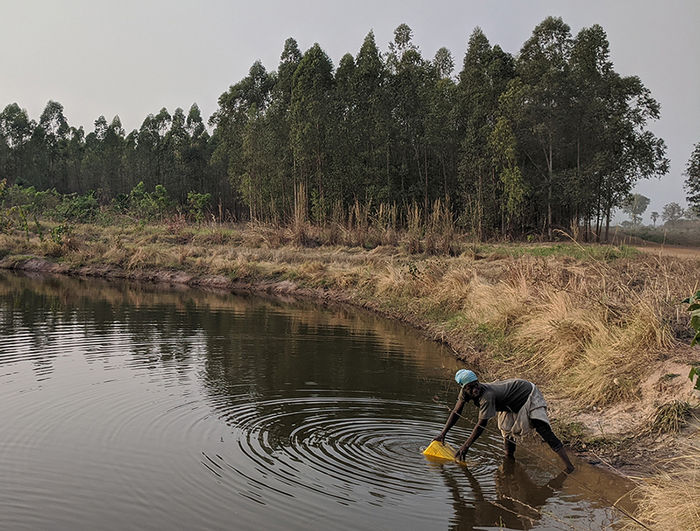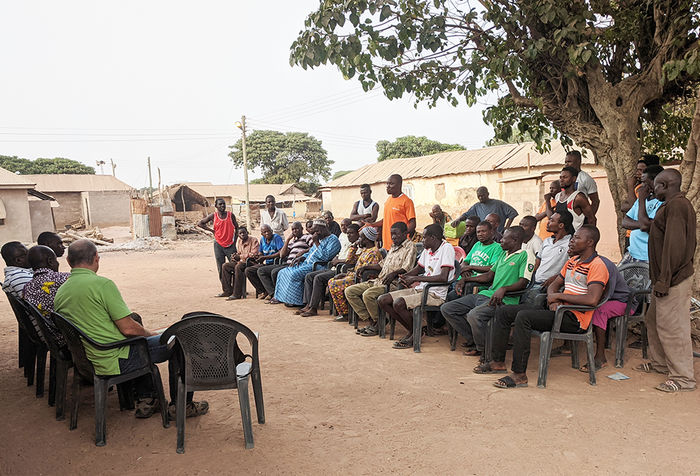
The network will support bidirectional student exchanges between the U.S. and African institutions, and works with small and independent farmers, communities, and public and private service providers to share new practices with global stakeholders.
UNIVERSITY PARK, Pa. — A team of Penn State researchers has received a $2 million grant from the National Science Foundation to lead a three-institution team developing the “SustainFood Network,” which will link scientists, communities and policymakers in addressing challenges at the nexus of water, energy and food security in Africa.
The award comes through NSF’s Accelerating Research through International Network-to-Network Collaborations — often referred to as AccelNet — program. The goals of that initiative are to accelerate the process of scientific discovery and prepare the next generation of U.S. researchers for multiteam international collaborations.
The AccelNet program supports strategic linkages among U.S. research networks and complementary networks abroad that will leverage research and educational resources to tackle grand research challenges that require significant coordinated international efforts. The program seeks to foster high-impact science and engineering by providing opportunities to cooperatively identify and coordinate efforts to address knowledge gaps and research needs.
“The SustainFood network synthesizes scientific best practices for sustainable and equitable food systems, renewable energy transitions and water governance in Africa to safeguard ecosystems so that they are resilient to weather extremes and political instability,” said team leader and project principal investigator Michael Jacobson, professor of forest resources, who has conducted research in Africa for decades.
Other members of the team at Penn State are Christopher Scott, Goddard Chair and professor in the Department of Ecosystem Science and Management, Abdullah Konak, Distinguished Professor of Information Sciences and Technology, Berks campus, and Esther Obonyo, associate professor and director of the Global Building Network in the College of Engineering.
“Food production requires sustainable use of water and energy, and that’s under pressure from growing populations and accelerating climate change,” noted Jacobson. The SustainFood Network will make connections among scientists, students, communities and policymakers to identify and implement solutions to water, energy and food in-security in Africa, which are critical for U.S. interests in scientific innovation, sustainability, and human and environmental security.
According to Jacobson, the SustainFood Network links scientists, communities and policymakers to conquer challenges related to water, energy and food security in Africa. These connections are critical for U.S. interests in scientific innovation, sustainability, and human and environmental security, he noted.
“This network addresses the need to improve agricultural yields while maintaining environmental integrity and supporting social equity,” he said. “These collaborations investigate climate-change impacts on food production, processing, distribution and consumption.”
The SustainFood network — jointly led by Penn State, Michigan State University and the Stockholm Environment Institute — links research and teaching institutions, nongovernment organizations, government and civil-society participants to develop solutions that address food- insecurity challenges across Africa with relevance for the U.S., Jacobson explained. The network contributes to science and expands knowledge on food production to promote food security through socially and environmentally sustainable practices.
The network will support bidirectional student exchanges between the U.S. and African institutions, and works with small and independent farmers, communities, and public and private service providers to share new practices with global stakeholders, Jacobson noted.
“The SustainFood network will organize place-based collaborative learning schools in Pennsylvania, Morocco, Mali, South Africa and Uganda over the next five years, he said. “These schools will provide an opportunity for convening network partners to participate in activities including problem elicitation with stakeholders, participatory modeling and policy dialogues — all of which will involve both African and U.S. students.”
Other network-building activities include early career researcher engagements, student-led webinars, “Collab-a-Thons” and ongoing data integration, synthesis and product development among partners, Jacobson added.
Deanna Behring, assistant dean for International Programs in the College of Agricultural Sciences, believes it is critical for Penn State to be engaged with Africa and to use the university’s expertise and resources to address challenges at the nexus of the continent’s water, energy and food security.
“Penn State and the college are dedicated to work to advance the 17 United Nations Sustainable Development Goals, and this project helps move the needle forward on several of them,” she said.
For more information about the SustainFood Network, contact Jacobson at mgj2@psu.edu.







